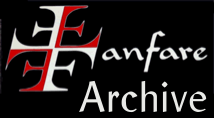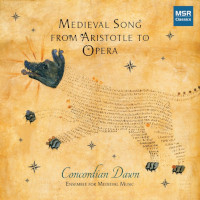Review by Colin Clarke
MEDIEVAL SONG FROM ARISTOTLE TO OPERA • Christopher Preston Thompson, dir; Concordian Dawn • MSR 1806 (67:38 &)
& Music of ANONYMOUS, MACHAUT, BERNART DE VENTADORN, PHILIPPE DE VITRY, RAIMON VIDAL
The further back one goes, the more informed musicological speculation is required. To move back to medieval music requires a plethora of informed guesses, but the revivification of this music is worth it, especially when the results are so palpably enchanting. This MSR disc is marked as “Volume 2” on the disc back cover; the first volume was therefore Fortuna Antiqua et Ultra, reviewed in Fanfare 46:2.
This disc is only one part of a greater project, including Sarah Kay’s book (which shares its title with the disc). Aristotle is relevant as the Aristotelian Weltanschauung was a vital influence on art in its various forms in the medieval era. As Oliver Strunk has observed in his Source Readings in Music History, “in the Middle Ages, Aristotle became the supreme philosophical authority,” adding that Aristotle’s ideas “remained imperfectly understood until the beginnings of textual criticism in the Renaissance” (Source Readings in Music History, W. W. Norton & Co. Inc, New York, 1950, p. 13); Strunk then goes on to provide an excerpt from the 1932 Heinemann edition of Aristotle’s Politics in which the philosopher elucidates why high art is necessary and where he cites music as an educational imperative (alongside reading and writing, gymnastics, and, “with some people,” drawing). Aristotle’s forensic examination of the effects of music and the philosophical good of music education as expounded in his Politics, his explanation of the effects of various musical modes, and his suggestions as to which musics and instruments should indeed be taught all affected musical thought (and still do).
Reference ideally should be sought via the project’s parallel website (the URL is in the booklet). Apart from the extra detail, there are alternative versions. For example, Philippe de Vitry’s In Virtute nominum / Decens carmen edere / Clamor meus from the Ivrea Codex can he heard online in two versions. On the disc version, the four voices (triplum, motetus, contratenor, and tenor) work in total harmony: Open intervals are just perfectly tuned. Soprano Michele Kennedy’s triplum seems markedly clean; the interaction of voices is beyond criticism.
The de Vitry is the second track. It is fitting that the collection actually begins with a celebration of the singing of the stars and sun in the dawn sky, Phebi claronondum orto iubare (The bright radiance of Phoebus) by that great composer Anonymous. One of the key tenets of Kay’s book is the contention that medieval song is a distinctive way of sounding words (as opposed to just words plus music). The use of instruments plus voice is very effective: The medieval harp introduction to the opening of Phebi, played by Christopher Preston Thompson, feels perfectly natural. The track only lasts 2:26, yet it has great variety of texture; the performance is remarkable, starting from chant over drone with harp end-of-phrase embellishment, and then moving to unaccompanied voices in parallel motion.
The name of Guillaume de Machaut is probably the most familiar of the musicians here (Aristotle probably trumps him otherwise). Some of the singers double as instrumentalists on this disc, and such is the case here: Countertenor David Dickey plays the recorder opening against Karin Weston’s gloriously free soprano in Joie, plaisance et douce nourriture, a “Chant royale” from Le remède de fortune. The title is pretty much self-explanatory (of course, Love is involved, with a capital “L”). Again, the website furnishes an alternative version (and these are quite rightly included, given the unknowns as regards this music’s performance), but this time goes one step further in introducing a performance video. Thompson’s score, transcribed on the website from a Machaut MS of 1586, is incredibly helpful, of course. This is one of Machaut’s better-known pieces; the Ensemble Binchois on the Cantus label, on a disc titled Le jugement du roi de Navarre, offers a short instrumental version, for instance, dance-like but curiously ceremonial too; the performance on the Eloquentia label on a disc, Le remède de fortune offers an altogether more rustic adventure. Of them all, this present version is the most melancholy and circumspect; the attention falls on detail, and the performance emerges as faultless.
An interlude is a fine idea: The 13th-century troubador song Ensement com la panthère (understandably of anonymous origin) is both sung and played by Thompson, who is a strong tenor. This is a true lament, and, yes, that is a panther reference at the outset. The medieval harp enjoys extended solo exposure here. It is fascinating to follow the performance along with the unmeasured score. The same holds similarly for the ensuing song, Volez vous que je vous chant?, this time heard with Clifton Massey as countertenor, with the principal vocal line pitted against recorder and vielho (the latter played by Niccolò Seligman). Soprano Michele Kennedy’s response is just as eloquent as Massey’s.
Machaut’s ballade Nés qu’on porroit comes from Le livre du voir dit. More songs from this can be heard alongside Machaut’s most famous work, La Messe de Notre Dame, on the recording by the Oxford Camerata and Jeremy Summerly on Naxos. That is a fine performance indeed; Summerly’s melding of scholarship and performance beauty is rare, and the disc is one to cherish. (J. F. Weber, who reviewed it in Fanfare 20:4, evidently agreed, as it made his 1997 Want List). Here, Michele Kennedy (soprano), and David Dickey and Clifton Massey (countertenors), offer an alternative take, more delicate and no less convincing. Three voices without instruments creates a web of vocalizations that one wishes fervently could just continue forever. Luckily, this is one of the longer tracks (7:40). Even longer, though, is Tieus rit au main qui au soire pleure (again from La remède de fortune), nearly 18 minutes of just Thompson and Seligmann, of tenor and vielle, an immersion in medieval storytelling of the very greatest nuance. The performers are clearly saturated in this music, and how it shows. The use of the word “opera” in the disc and book title comes in here with the elevation of text as dramatic experience, an appreciation of which, according to Kay, was informed by her love of opera.
The name of troubadour-composer Bernart de Ventadorn has been around in my history studies, certainly, but this is possibly the first piece of his music I have heard. Here, a “contrafact” is offered: Con lo boschatges en floritz, from his En consirer et en esmai. The extraordinary countertenor of Clifton Massey is featured here; his moment in the spotlight reveals a voice that has a truly unique, special quality, gleaming and incredibly expressive, while capable of the most subtle shadings. Thompson’s harp is perfectly judged, as is the entrance of the drone.
Similarly, the bass of Andrew Padgett shines in the next number. The details of this penultimate offering are as speculative as they are complex: The melody for the contrafactum Entre.l Taur e.l Doble Signe is from Bertran de Born’s Rassa tan creis via Monge de Montaudan’s Mot m’envaya, while the text itself has enjoyed a variety of attributions. It is, however, impossibly lovely, a celebration for the season “between Taurus and Gemini,” as the text pus it (Spring, in other words). Padgett throws himself into the song, ably supported by Seligmann.
Perhaps rightly, MSR’s offering ends with Machaut, and one of his more famous chansons: En amer a douce vie, a balladelle from La remède de fortune. My favored version of this has been the Orlando Consort on Archiv; Concordian Dawn is slightly more raw, and the addition of instrumental lines (recorder and vielle) is most effective, but really one must have both (with the Orlando disc you get a stack of Machaut; the review of that disc in Fanfare 46:5 also speaks highly of “exquisite” performances).
It is interesting that in his review of Kay’s book in this issue, J. F. Weber lists some composers who have taken medieval song as their theme, one of which is Grétry’s Richard, Cœur de Lion (an opera staged fairly recently, and unforgettably, at Versailles and which furnished a theme for a set of Beethoven variations). There is fertile ground for rediscovery in several other examples, too. It’s food for thought, certainly, and worth mentioning that the Grétry is available on the Château de Versailles Spectacles label.
There is no way Medieval Song from Aristotle to Opera is not making my next Want List. It stimulates on every level: in its scholarship, in its veracity, in its musicality and even, given the music’s antiquity, on some primal level. The recording is fabulous too, with just the right distancing of voices and instruments. Unforgettable. Colin Clarke






















